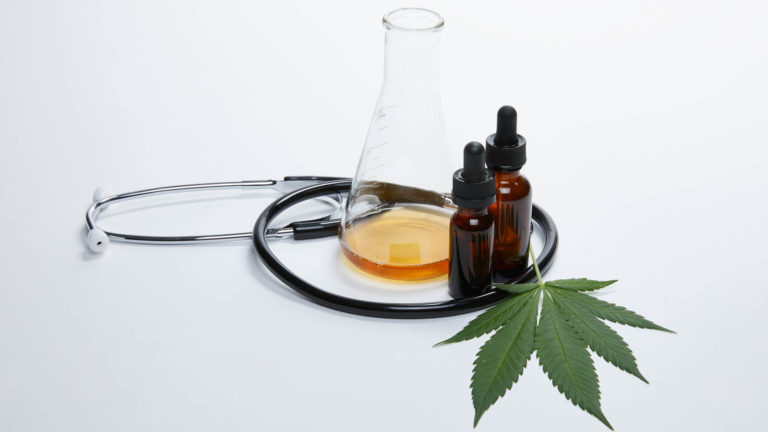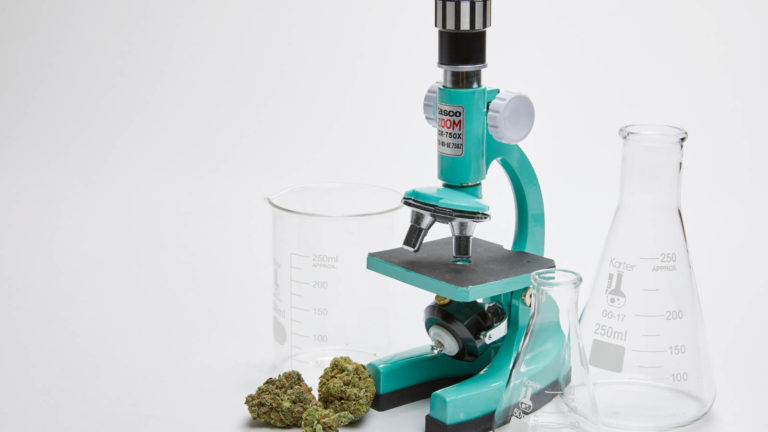According to the Centers for Disease Control and Prevention, cancer is the second leading cause of death in the United States.
Cancer refers to a group of more than 100 chronic illnesses that occur when cells begin to grow and proliferate abnormally in the body. In spite of decades of expert research and investment, there is still no known cure for cancers. Those diagnosed with cancer are frequently treated with therapies such as radiotherapy, chemotherapy, or immunotherapy.
A cancer diagnosis may instill fear or anxiety in many, as may the prospect of first-line treatments that often carry adverse side effects. Researchers are beginning to explore the possible applications of cannabinoids such as cannabidiol (CBD) in cancer treatments to determine whether they may help prevent the development of cancer, retard cancer growth, or kill cancerous cells.
Research overview
Both in vitro (petri dish) and in vivo (within living organisms) studies have demonstrated a variety of ways in which CBD may offer therapeutic benefits for the treatment of cancer.
CBD has been recognized as a potential anti-cancer treatment that hinders the spread of cancerous cells. CBD possesses anti-tumorigenic and anti-proliferative properties which interfere with the growth and proliferation of tumors, the migration of cancer cells, or their adhesion to organs or tissue.
CBD also exhibits another quality which renders it potentially useful as a cancer treatment. Research published in 2012 in the British Journal of Pharmacology has shown that CBD can influence tumor angiogenesis, which is the formation of new blood vessels from pre-existing ones and is a critical way that tumors grow, invade and metastasize within the body. Preventing the creation of new blood vessels can help to slow or cease tumor growth.
 Photo by: Gina Coleman/Weedmaps
Photo by: Gina Coleman/WeedmapsImage lightbox

CBD may also be a beneficial complementary therapy for managing symptoms associated with cancer or the side effects of first-line cancer treatments such as chemotherapy. CBD can help to alleviate anxiety, inflammation, and neuropathic pain, which are common symptoms associated with cancer or its treatment.
The studies
A 2018 review published in Cancer Medicine, a Wiley journal, emphasized that a range of studies on CBD has demonstrated its anti-cancer applications. CBD has been shown to reduce the viability of cancer cells in neuroblastoma, glioblastoma, melanoma, leukemia, colon, breast, lung, and prostate cancer in animal and in vitro models. The authors of the review proposed that CBD may induce cell death (apoptosis) in cancer cells via indirect activation of the CB2 receptor.
Several studies have investigated the therapeutic potential of CBD for the treatment of breast cancer. One 2006 study published in the Journal of Pharmacology and Experimental Therapeutics found that CBD was one of the most potent inhibitors of breast tumor cell growth in a panel of five cannabinoids tested on rats and mice.
Both CBD and CBD-rich extracts were also found to reduce the infiltration of lung metastases. The study's authors proposed that CBD induced cancer cell death by activating the TRPV-1 receptors, indirectly activating the CB2 receptors, and inducing oxidative stress. Elevated oxidative stress can kill cancer cells, according to a 2018 study published in Cell Metabolism.
A 2007 study in cellular models, published in Molecular Cancer Therapeutics, found that CBD not only interferes with the proliferation of breast cancer cells, but also hinders the migration, invasion, and metastasis of breast cancer cells. One way in which CBD achieves this is by regulating the expression of key genes involved in cell proliferation, such as the Id-1 gene.
 Photo by: Gina Coleman/Weedmaps
Photo by: Gina Coleman/WeedmapsImage lightbox

Overexpression of this gene in breast cancer cells is responsible for the spread of cancer. As CBD can significantly decrease Id-1 expression, it can reduce the aggressiveness of breast cancer tumors. CBD also appears to have no adverse effect on non-cancerous mammary cells.
There is also evidence that CBD can successfully target gliomas, which are tumors that are found in the brain or spinal cord. CBD can reduce the proliferation of cancerous glial cells, their invasiveness, and their migration to other parts of the body. There are several mechanisms by which CBD achieves this.
According to one 2013 study published in PLoS One that used cultured cells, CBD inhibits the proliferation of glioma cells by down-regulating two signaling molecules that are known to help tumors spread. Another 2006 in vitro study published in Cellular and Molecular Life Sciences, a Springer journal, found that CBD caused the death of cancerous tissue by inducing oxidative stress and by gradually activating specific proteins. Non-cancerous glial cells were left unharmed.
Although many of the studies investigating CBD as a treatment for cancer present promising or hopeful results for novel therapies, scientists also caution that in some cases, CBD could potentially support the growth of tumors due to its immunosuppressive qualities. Clinical studies on humans are needed to understand how to harness the anti-cancer potential of CBD safely and effectively.
Patient perspectives
John Stine, whose name has been changed for this article, was diagnosed with urothelial cancer in 2018. He first began using full-spectrum CBD oil when he heard it might help counteract the intoxicating effects of the cannabis oil he was taking to stimulate appetite and relieve nausea.
“I take double-strength CBD oil sublingually. The drops seem to have a therapeutic effect, as I feel calm and less anxious after I have them,” Stine told Weedmaps. “I think the CBD oil also helps to alleviate the pain and inflammation associated with my cancer.”
Individuals have also expressed their views of CBD oil on a Cancer Research UK forum. One contributor revealed that her husband had begun taking CBD oil in a bid to help retard tumor growth and alleviate pain, in spite of the oncologist disapproving.
“My husband has been on it for about two weeks now. His pain is not significantly better, but it's not worse. Also, there has been a massive mood improvement,” the contributor stated in the forum chat. “As CBD is not regulated and it's unclear what the right doses are, I did start at the bottom end, so maybe the strength or amount I am giving isn't enough. I still don't regret it though. It's had a positive effect with no bad side effects.”
What the experts say
Dr. Jordan Tishler is a cannabis medicine expert and CEO of the Association of Cannabis Specialists. According to Tishler, CBD shows promise as a treatment for some forms of cancer.
”There is a growing body of literature showing that CBD, THC, and other cannabinoids can be effective in killing certain cancer cells,” Tishler told Weedmaps. “It's interesting that CBD seems to work independently, and also together with THC. In fact, there are studies showing that whole plant extracts are more effective than isolates of any individual cannabinoid.”
 Photo by: Gina Coleman/Weedmaps
Photo by: Gina Coleman/WeedmapsImage lightbox

Tishler explains that it's critical to remember, however, that the studies conducted on CBD thus far have been pre-clinical, meaning they have been carried out on animal models or in vitro on human cells, and are not yet ready to be applied to human disease.
“When patients ask about using cannabis to treat their cancer we must have a long earnest discussion of how preliminary the data really are, and how cannabis is not a reasonable substitute for conventional treatment,” Tishler emphasized.
“It does, however, make a reasonable adjunct since it is relatively non-toxic.”
Tishler recommends the use of whole-plant CBD extracts for cancer patients at his Massachusetts-based cannabis clinic, InhaleMD.
“I do recommend CBD, almost always in conjunction with THC, for the treatment of cancer. However, this is really only justified as an adjunctive treatment, not as a primary one, since the data are both sparse and preliminary.”
For the treatment of symptoms associated with cancer such as nausea and lack of appetite, Tishler advocates a THC-dominant preparation.
Bottom line
There is substantial research to support CBD as a promising, novel, adjunct cancer treatment, though studies have not yet advanced to trials on humans. Further research and placebo-controlled clinical trials are required, however, to better understand CBD and its effects on cancers or the interactions between CBD and first-line cancer therapies such as radiotherapy or chemotherapy. Patients should not attempt to use CBD as a primary treatment for cancer.
Major contributions from Dr. Adie Rae.

